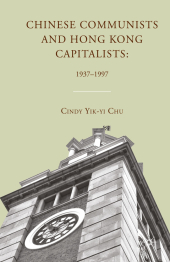 Neuerscheinungen 2010Stand: 2020-01-07 |
Schnellsuche
ISBN/Stichwort/Autor
|
Herderstraße 10
10625 Berlin
Tel.: 030 315 714 16
Fax 030 315 714 14
info@buchspektrum.de |

C. Chu
Chinese Communists and Hong Kong Capitalists: 1937-1997
1st ed. 2010. 2010. xi, 196 S. 216 mm
Verlag/Jahr: SPRINGER PALGRAVE MACMILLAN; PALGRAVE MACMILLAN US 2010
ISBN: 1-349-29085-8 (1349290858)
Neue ISBN: 978-1-349-29085-7 (9781349290857)
Preis und Lieferzeit: Bitte klicken
This book examines Chinese Communist activities in Hong Kong from the outbreak of the Sino-Japanese War in 1937 to the handover in 1997. It reveals a peculiar part of Chinese Communist history, and traces six decades of astounding united front between the Chinese Communists and the Hong Kong tycoons and upper-class business elite.
The United Front Policy of the Chinese Communists in Hong Kong during the Sino-Japanese War, 1937-1945 Overt and Covert Functions of the Hong Kong Branch of the Xinhua News Agency, 1947-1984 The Origins of the Chinese Communist Alliance with the Hong Kong Business Elite, the 1997 Question, and the Basic Law Committees, 1979-1985 The Involvement of the Business Elite in the Drafting of Hong Kong´s Basic Law and the Problems of the United Front Policy, 1985-1990 The Chinese Communists´ United Front with Big Business and Their Collaboration on the Handover, 1990-1997 The Selection of the Chief Executive, May-December 1996 Tung Chee-hwa and the Last Days of Colonial Hong Kong, December 1996-June 1997
"Throughout this useful study, a united front strategy frames the relationship between the Chinese Communist Party (CCP) and Hong Kong capitalists from 1937 to 1997. ... Chu´s narrative makes a strong case for the long-term continuity of Hong Kong´s elitist political parameters both before and after the 1997 transition. Summing up: Recommended. Upper-division undergraduate students through professionals." - R. P. Gardella, CHOICE
"This ground-breaking work emphasizes the crucial relationship between the Chinese Communist Party and the Chinese business elite of Hong Kong during the 60 years before 1997. The author argues convincingly that the strategy of collaborating closely with capitalists, far from contradicting the ideological principles of Communism, in fact has deep roots in the Party s decades-old united front policy. This is a powerful revelation for historians of modern China and for readers concerned with contemporary developments." - Elizabeth Sinn, Former Deputy Director of the Centre of Asian Studies, University of Hong Kong
"Chu argues that the implementation of the one country, two systems model guaranteeing Hong Kong s capitalist system until 2047 must be understood through the framework of the Chinese Communists united front strategy that began in the 1930s. Chu questions the conventional assumption that the Chinese Communist Party had no understanding of Hong Kong s capitalist system. Rather, she shows how the Communists adapted to the colony s capitalist environment by creating a network of local agencies under direct Party control. Unlike on the mainland, the Communists worked hard to forge effective alliances with Hong Kong s Chinese capitalists. By the eve of the handover in 1997, the Communists had consolidated the support of big business for the retrocession to Chinese sovereignty. This important new study contributes not only to our understanding of Hong Kong history but also of the Chinese Communist Party." - John M. Carroll, Professor of History, University of Hong Kong


